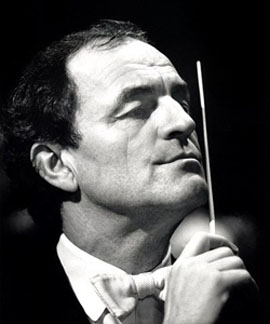
Charles (Edouard) Dutoit. Conductor, violinist, violist, b Lausanne, Switzerland 7 Oct 1936; BSc Mathematics (Lausanne?) 1953 or 1957?, premier prix - violin (Conservatoire de Lausanne) 1956, diploma in conducting (Conservatoire de Genève) 1958, hon doctorate (Montreal) 1984, hon D MUS (Laval) 1985, hon D MUS (McGill) 1996. Charles Dutoit took up violin at 11, entering the Conservatoire de Lausanne at 15. He studied mathematics and violin - with some early conducting lessons - at Lausanne, then studied conducting with Samuel Baud-Bovy and viola with Ron Golan at the Conservatoire de Genève (1958), where he gained a mentor in Ernest Ansermet. After graduating, Dutoit attended the Accademia Musicale Chigiana in Siena, Italy, studying with Alceo Galliera, and in 1959 studied at Berkshire (Tanglewood) with Charles Münch. Dutoit was a freelance orchestra violist 1957-9 and choral conductor at the University of Lausanne 1959-63. His first regular orchestral conducting position came in 1964 (associate conductor at the Bern Symphony Orchestra); other appointments during the following years included posts with the Radio Lausanne Orchestra, the National Symphony Orchestra of Mexico, and the Göteborg Symphony Orchestra.
Montreal Symphony Orchestra (1977-2002)
In 1977, Dutoit was appointed principal conductor of the Montreal Symphony Orchestra (having guest-conducted it 15 Feb 1977) and began what was unarguably the most successful conductor-orchestra partnership in Canadian history. This began in earnest in 1980 with Dutoit's signing an exclusive contract with Decca-London, resulting in the 1981 recording of Daphnis et Chloé, which won the first of many Junos. Dutoit then undertook the MSO's first North American tour, kicking off a series of tours to Japan, Hong Kong, South Korea, and South America, and throughout Europe. In 1982, he conducted the orchestra in their second performance at Carnegie Hall; their success resulted in an annual engagement. The recordings of Ravel's works (1985), Holst's The Planets (1987), and Bartók's Concerto for Orchestra and Music for Strings, Percussion, and Celesta (1989) won Juno awards and cemented Dutoit's success with the ensemble. In 1991, Dutoit released his first opera recording, Debussy's Pelléas et Mélisande, followed in 1994 with Berlioz's Les Troyens, the latter winning a Grammy.
He became principal guest conductor of the Minnesota Orchestra in 1983. In 1990 Dutoit accepted a summer appointment with the Philadelphia Orchestra, and later was principal conductor with l'Orchestre National de France (1991-2001) and the NHK Symphony (1996-8; music director 1998-2003; later music director emeritus). Though Dutoit's recording successes continued with the MSO, relations within the orchestra deteriorated, with petitions filed. Resultantly, Dutoit tendered his resignation 11 Apr 2002. The once most productive relationship in Canadian classical music was left in disarray.
Since the MSO (2002 - Present)
During and after his tenure at the MSO, Dutoit was a frequent guest conductor with the main orchestras in, eg, Amsterdam, Berlin, Chicago, Cleveland, London, Los Angeles, Munich, New York, Philadelphia, Pittsburgh, and San Francisco, and at La Scala. In 2003 he began conducting Wagnerian operas at the Teatro Colon in Buenos Aires. He also headed Japan's Sapporo Pacific Music Festival and Miyazaki International Music Festival. In 2005, he founded the Canton International Summer Music Academy in Guangzhou, China and became head of the Verbier Festival Orchestra in Switzerland in July 2009. In 2008 he became chief conductor of the Philadelphia Orchestra, followed by the Royal Philharmonic's announcement in April 2007 that he would be their principal conductor 2009-10.
Dutoit has also returned to Canada for several engagements.
Style
The repertoires that Dutoit is best known for, and to which the characteristic orchestral colour and lyricism he elicits is best suited, are the French and Russian composers of the 19th and 20th centuries. He is considered one of the finest interpreters of Ravel's music, and his recordings of Stravinsky's ballets have become classics. He has worked successfully with other styles, recording one of the foremost versions of The Planets, and has been recognized for his work with de Falla's music.
Awards and Honours
Many honours have been bestowed on Charles Dutoit. Of particular note are the 1972 Canadian Music Council Award; Grand Prix du disque français (1983); Grand Prix du président de la République (France); the Prix mondial du disque de Montreux; the High Fidelity International Record Critics' Award; the Amsterdam Edison Award; the Japan Record Academy Award; the German Music Critics' Award; the Canadian Music Council Medal (1988); 10 Juno awards; and 2 Grammy awards. Dutoit was named an honorary citizen of Philadelphia (1991), a Grand Officier de l'Ordre National du Québec (1995), Commandeur de l'Ordre des Arts et des Lettres de la République Française (1996), and honorary officer of the Order of Canada (investiture 2002).
See also "Montreal Symphony Orchestra Upheaval," Maclean's, 22 Apr 2002

 Share on Facebook
Share on Facebook Share on X
Share on X Share by Email
Share by Email Share on Google Classroom
Share on Google Classroom


